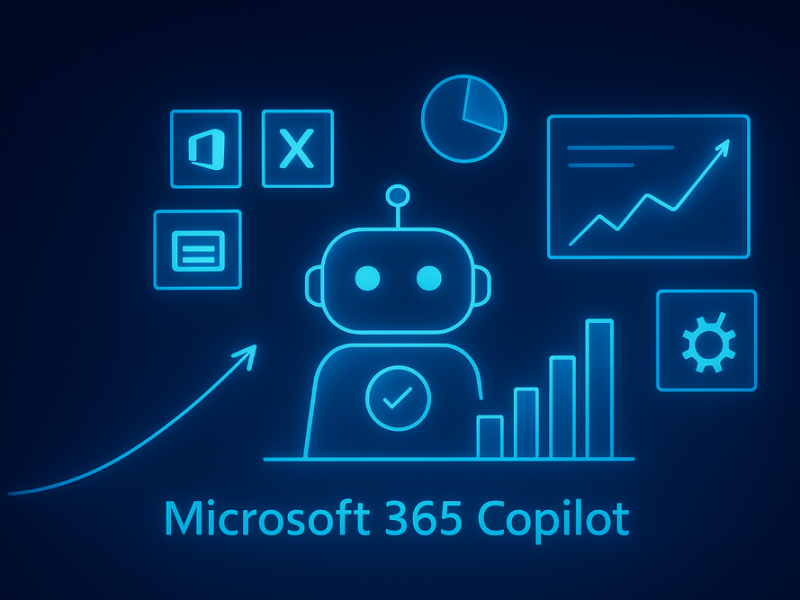Blog
Latest in the adoption of Microsoft 365 Copilot in FY26

The world of work continues to evolve at a breakneck pace, and FY26 promises to be a year of unprecedented change as organizations increasingly adopt Microsoft 365 Copilot. This cutting-edge AI-powered tool is redefining productivity, collaboration, and decision-making across industries. Here's an in-depth look at the latest developments surrounding its adoption, along with insights into how businesses are leveraging its capabilities to achieve new heights of efficiency and innovation.
Microsoft 365 Copilot: A Game-Changer
Microsoft 365 Copilot is an AI-driven assistant integrated into the suite of tools familiar to millions of businesses worldwide, including Word, Excel, PowerPoint, Outlook, Teams, and more. Copilot leverages the power of large language models (LLMs) combined with organizational data from Microsoft Graph to deliver intelligent recommendations, automate repetitive tasks, and generate content, thereby saving users time and enhancing their productivity.
Why Businesses Are Embracing Copilot
The adoption of Copilot in FY26 is driven by several factors:
- Enhanced Productivity: Copilot automates mundane tasks such as drafting emails, summarizing documents, and analyzing data, allowing employees to focus on higher-value activities.
- Improved Collaboration: By providing actionable insights during meetings and streamlining communication, Copilot enhances teamwork and coordination.
- Data-Driven Decision Making: Copilot's ability to sift through vast amounts of data and present key insights helps organizations make informed decisions efficiently.
- Customization: Tailored solutions based on organizational needs ensure that Copilot is adaptable to diverse business environments.
Adoption Trends in FY26
As we step into FY26, the adoption of Microsoft 365 Copilot is accelerating across sectors, from small businesses to multinational enterprises. Some key trends include:
Widespread Integration Across Industries
Industries such as healthcare, finance, retail, and technology are leading the charge in integrating Copilot into their workflows. Hospitals are using Copilot to draft patient summaries, while financial institutions employ it to analyze investment portfolios. Retailers are leveraging its capabilities to optimize inventory management, and tech companies are utilizing it to automate coding tasks.
Focus on Upskilling
The rise of Copilot adoption is paired with a growing emphasis on upskilling employees. Organizations are investing in training programs to ensure their workforce can maximize the benefits of AI tools. From learning how to prompt Copilot effectively to understanding its analytical capabilities, businesses recognize that an informed user base is essential for successful implementation.
Scaling AI Across Teams
While initial implementations often begin with specific departments, such as marketing or operations, FY26 sees organizations scaling Copilot across entire teams and functions. This holistic approach ensures uniform improvements in productivity and fosters a culture of digital transformation.
Challenges and Solutions
Despite its transformative potential, the adoption of Microsoft 365 Copilot is not without challenges. Among them are concerns about data privacy, resistance to change, and the cost of implementation.
Addressing Privacy Concerns
Microsoft has prioritized security and compliance in Copilot's design. Its integration with Microsoft Graph ensures that sensitive organizational data remains secure and is processed within the framework of strict privacy protocols. Organizations adopting Copilot are encouraged to communicate these safeguards to their teams to build trust and confidence.
Overcoming Resistance to Change
Change management is critical in the adoption of new technologies. Businesses are implementing strategies to ease the transition, including pilot programs, gradual rollouts, and open forums for addressing employee concerns. Demonstrating the tangible benefits of Copilot through case studies and success stories has also been effective in overcoming skepticism.
Cost Considerations
While integrating AI tools like Copilot requires upfront investment, many businesses view it as a strategic expense that pays dividends in the long term. Microsoft has introduced tiered pricing models to accommodate organizations of various sizes, ensuring accessibility to a broad spectrum of users.
Microsoft's Commitment to Innovation
Microsoft remains committed to enhancing Copilot's capabilities. FY26 is expected to bring several updates, including improved natural language processing, expanded integrations with third-party applications, and features designed to support hybrid work environments.
Partnering for Success
Microsoft's extensive partner ecosystem plays a pivotal role in driving Copilot's adoption. Certified partners are offering consulting services, implementation support, and tailored solutions to help organizations seamlessly integrate Copilot into their operations.
Success Stories
The impact of Microsoft 365 Copilot is already evident in numerous success stories. For example, a global consulting firm reported a 30% increase in productivity after deploying Copilot across its teams. Similarly, a mid-sized e-commerce company streamlined its customer support processes, reducing resolution times by 50%.
Call to Action
As FY26 unfolds, Microsoft 365 Copilot is poised to become an indispensable tool for organizations striving to stay ahead in a rapidly evolving business landscape. Whether you're a decision-maker exploring AI solutions or an IT professional seeking guidance on implementation, now is the time to act.
Contact us at This email address is being protected from spambots. You need JavaScript enabled to view it. to learn more about how Microsoft 365 Copilot can transform your business. Our SureStep Ambassadors are ready to help you navigate the future of work and unlock the full potential of AI. Let’s build a smarter, more productive tomorrow together.


